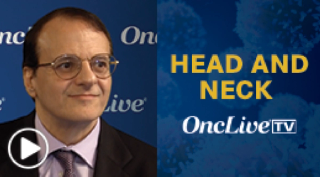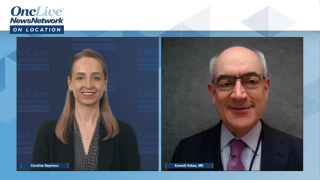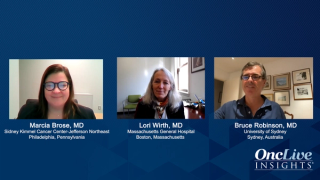
Head & Neck Cancers
Latest News


Selpercatinib Significantly Improves PFS Over MKIs in RET-Mutant Medullary Thyroid Cancer

FDA Issues CRL to NDA for Avasopasem in Radiotherapy-Induced Severe Oral Mucositis in Head and Neck Cancer
Latest Videos

CME Content
More News

Treatment with ASP-1929 in combination with pembrolizumab led to responses and was well tolerated in patients with recurrent or metastatic head and neck squamous cell carcinoma.

The US indication for pralsetinib in the treatment of adult and pediatric patients aged 12 years and older with advanced or metastatic RET-mutant medullary thyroid cancer who require systemic therapy has been voluntarily withdrawn by Genentech.

A panel of head and neck cancer experts discussed the nuances of managing relapsed or refractory DTC with lenvatinib or sorafenib, as well as sequencing considerations with targeted therapies in the second-line setting and beyond for patients with relapsed or refractory disease.
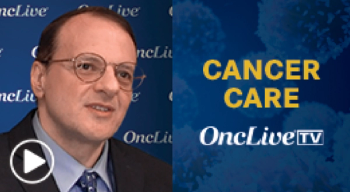
Nabil F. Saba, MD, FACP, discusses key findings from the phase 3 CONTINUUM trial of sintilimab plus chemoradiotherapy in patients with locally advanced nasopharyngeal carcinoma.

The addition of sintilimab to chemoradiotherapy demonstrated a significant reduction in the risk of disease recurrence or death, distant metastasis and locoregional recurrence compared with chemoradiotherapy alone as frontline therapy in patients with locally advanced nasopharyngeal carcinoma, according to findings from the phase 3 CONTINUUM trial.
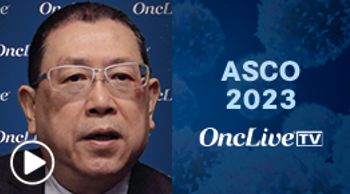
Jun Ma, MD, discusses findings from the phase 3 CONTINUUM trial of sintilimab in combination with induction chemotherapy and concurrent chemoradiotherapy in patients with locoregionally advanced nasopharyngeal carcinoma.

Darolutamide was well tolerated and generated clinically meaningful activity across secondary end points in the treatment of patients with androgen receptor–positive salivary gland cancer.

Bernard Doger de Spéville, MD, PhD, discusses key findings from part C of the phase 2 TACTI-002 trial of eftilagimod alpha plus pembrolizumab as second-line treatment for patients with head and neck squamous cell carcinoma.

Before closing out their discussion on RR DTC management, panelists consider the advent of sequencing through multiple lines of therapy.

Shared insight on the optimal use of RET inhibitor therapy in select patients with RET-rearranged radioiodine-refractory differentiated thyroid cancer.

Centering discussion on the final clinical scenario of RR DTC, Francis Worden, MD, highlights the management of a patient with an identified RET rearrangement.

Expert panelists provide comprehensive insight to the utilization of second-line therapy for patients with RR DTC, covering formulation, dosing, and adverse event management.

A broad view of clinical data behind use of cabozantinib therapy in the second-line setting of radioiodine-refractory differentiated thyroid cancer.

Moving on to a new clinical scenario, Lori Wirth, MD, reviews the second-line management of a patient who progresses on frontline systemic therapy.

Before closing out their discussion on the frontline treatment setting of RR DTC, panelists highlight dose reductions and planned treatment holidays to mitigate adverse events.

Expert perspectives on real world and quality of life data behind systemic therapy in patients with radioiodine-refractory differentiated thyroid cancer.

Expert oncologists work together to review the treatment armamentarium for radioiodine-refractory differentiated thyroid cancer and identify factors that best inform selection of therapy.

Barbara Burtness, MD, discusses preclinical data on the combination of VIC1911 and adavosertib in head and neck squamous cell carcinoma and lung cancer.

A brief review of when it is appropriate to initiate systemic therapy in patients with differentiated thyroid cancer as opposed to continuing active surveillance.

Key opinion leaders in differentiated thyroid cancer take a moment to define radioiodine refractory disease and consider its implications in establishing a treatment pathway.

The bispecific antibody petosemtamab delivered responses with a manageable safety profile in patients with advanced head and neck squamous cell carcinoma.

University of Cincinnati Cancer Center researchers presented more than a dozen abstracts at the 2023 American Association for Cancer Research Annual Meeting, including findings that could advance treatments for head and neck and breast cancers.

The FDA has granted a fast track designation to RRx-001 for the prevention and attenuation of severe oral mucositis associated with chemotherapy and radiation in patients with head and neck cancer.

RBN-2397, a PARP7 inhibitor, was found to be well tolerated and have preliminary antitumor activity as monotherapy in patients with advanced solid tumors, including head and neck squamous cell carcinoma, breast cancer, and squamous cell carcinoma of the lung.

Avasopasem manganese provided an overall clinical benefit vs placebo in reducing the burden of severe oral mucositis in patients with locally advanced head and neck cancer, according to a post-hoc generalized pairwise comparison analysis of the phase 3 ROMAN trial.





